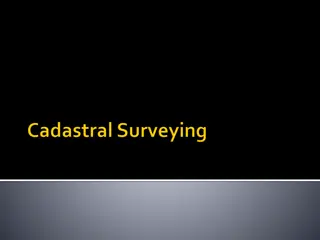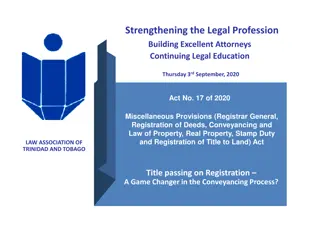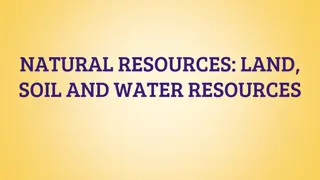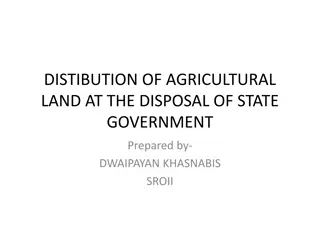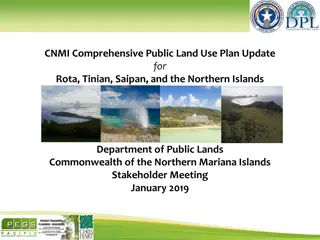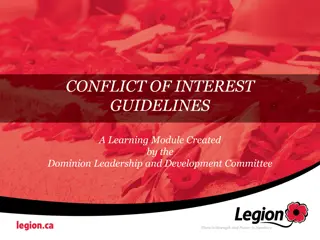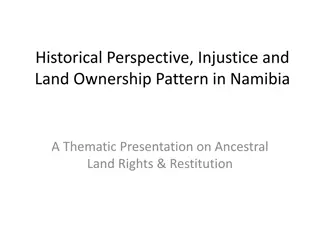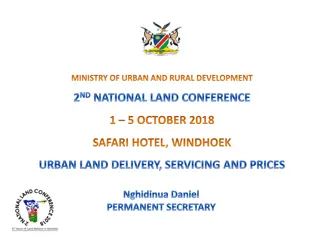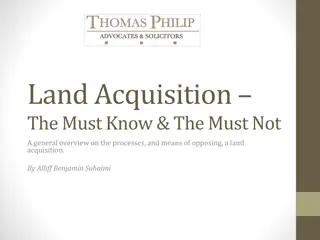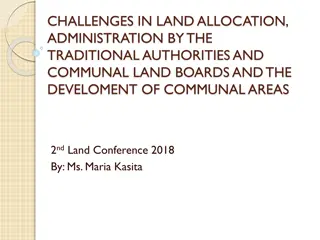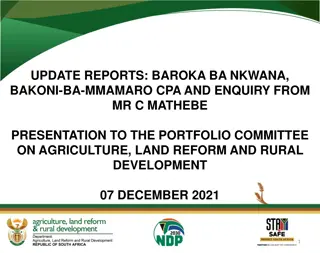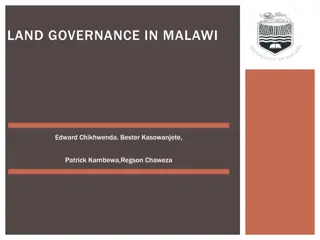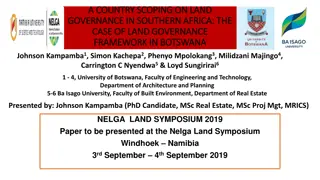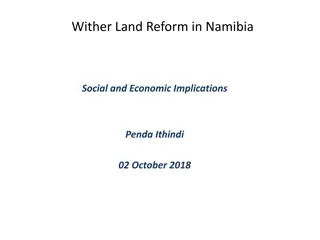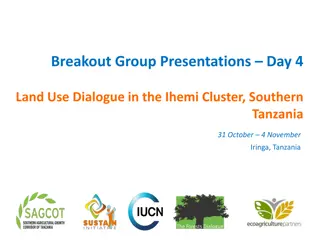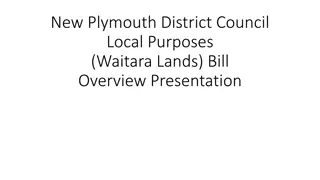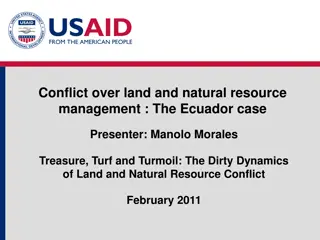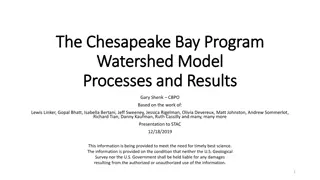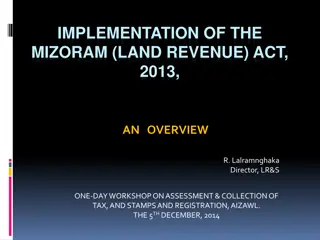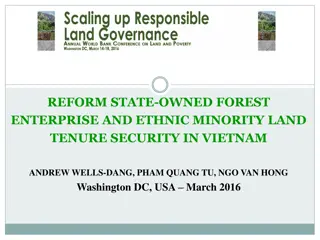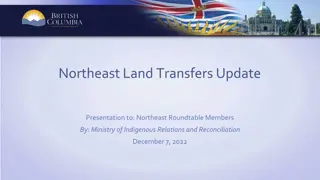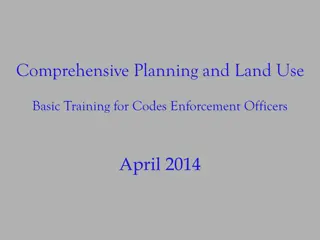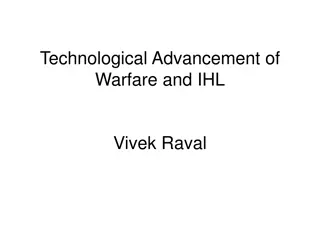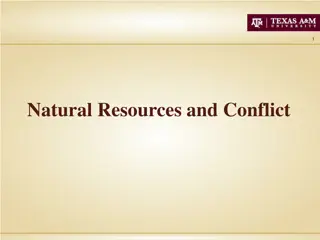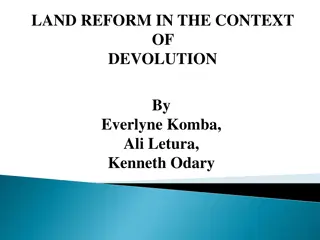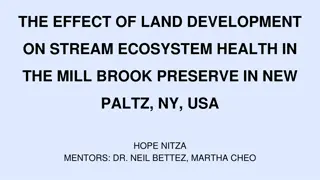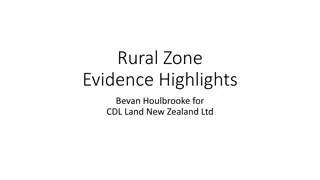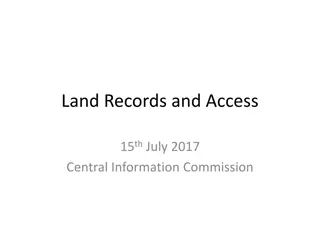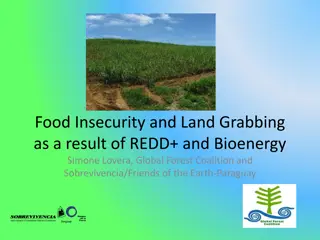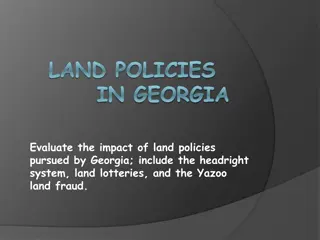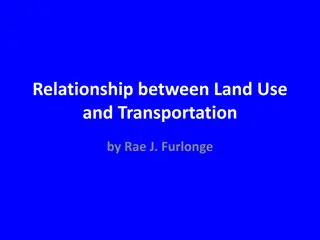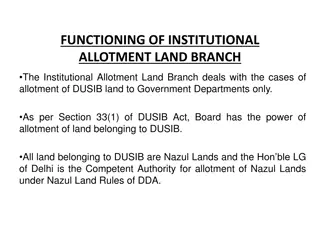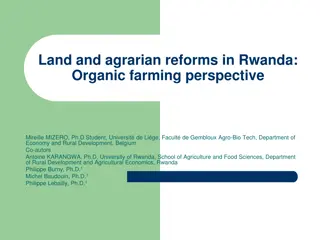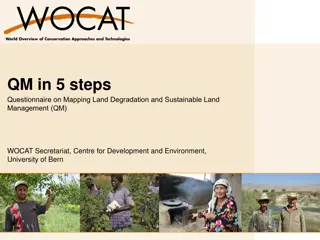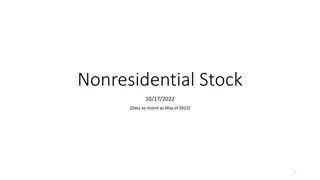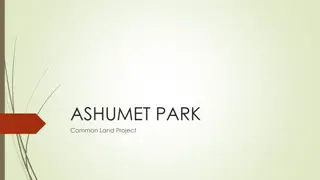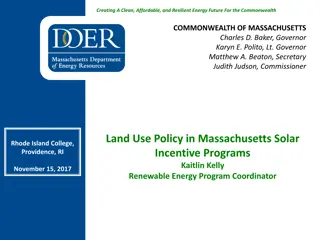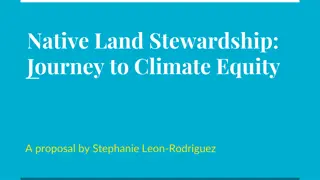Understanding Cadastral Systems in Land Management
Cadastral systems play a crucial role in land management by handling land registration, property taxation, and land tenure. These systems involve private conveyancing, registration of deeds, cadastral surveying, and mapping to maintain records efficiently. They provide information on parcel index ma
1 views • 16 slides
Evolution of Land Law Systems in Trinidad and Tobago
Trinidad and Tobago's land law systems consist of the Common Law System and the Registered Land System. The Common Law system governs unregistered land where title passes upon execution and delivery of the deed. In contrast, the Registered Land System confers ownership upon registration and offers c
0 views • 28 slides
Understanding Land, Soil, and Water Resources
Natural resources such as land, soil, and water are crucial for human activities. Land comprises the lithosphere and is utilized for various purposes based on land use patterns. The study of land use patterns is essential for economic planning, as the availability of land is limited, leading to conf
5 views • 25 slides
Principles of Agricultural Land Distribution by State Government
The article discusses the distribution of agricultural land at the disposal of the state government in line with the policy objectives outlined in the WBLR Act. It covers the types of agricultural lands available, principles of land distribution, and restrictions on land transfers. Priority is given
0 views • 14 slides
CNMI Public Land Use Plan Update Stakeholder Meeting 2019
The CNMI Comprehensive Public Land Use Plan Update details the key drivers for land selection, recommendations for future land uses on each island, and includes discussions on the project team, schedule of key milestone dates, and the purpose and scope of the plan outreach and participation. The sta
4 views • 29 slides
Conflict of Interest Guidelines Learning Module
This learning module created by the Dominion Leadership and Development Committee explores conflicts of interest in the context of organizational decision-making. It defines conflicts of interest, outlines when conflicts arise, and differentiates between real, potential, and apparent conflicts. Addi
5 views • 8 slides
Namibia's Ancestral Land Rights: Historical Injustice and Restitution
Explore the historical context of land ownership in Namibia, focusing on ancestral land rights, colonization processes, and the impact on indigenous populations. Learn about the notion of ancestral land, who should be considered indigenous, and the colonial modes of land acquisition. Uncover the str
0 views • 33 slides
Challenges and Solutions in Urban Land Delivery and Pricing in Namibia
The Urban Land and Housing Sector in Namibia faces significant challenges such as a backlog in land delivery, high input costs, weak urban planning, and limited institutional capacity. These issues lead to slow supply rates and affordability problems for end users. Addressing these challenges requir
0 views • 20 slides
Understanding Land Acquisition Processes and Means of Opposing
Federal laws in Malaysia allow for land acquisition for public purposes or economic development. The process involves notification to the public, entry and survey marking of land, and award by the Land Administrator. Only persons defined as "interested" under the Land Acquisition Act can raise objec
3 views • 40 slides
Challenges in Land Allocation and Administration by Traditional Authorities and Communal Land Boards
The Communal Land Reform Act of 2002 introduced Communal Land Boards to assist Traditional Authorities in land administration. However, challenges such as misconceptions of powers, limited technical capacity, inadequate resources, and unclear procedures have hindered smooth registration and resoluti
0 views • 15 slides
Update Reports: Baroka Ba Nkwana, Bakoni-Ba-Mmamaro CPA, and Enquiry from Mr. C. Mathebe Presentation to the Portfolio Committee on Agriculture, Land Reform, and Rural Development
This report provides updates to the Portfolio Committee on Agriculture, Land Reform, and Rural Development regarding Mr. Collen Mathebe's matter, Bakoni-Ba-Mmamaro CPA, and Baroka Ba Nkwana Land Claim. Mr. Mathebe's issue cannot be resolved through the Land Title Adjustment Act, and alternative opti
0 views • 38 slides
Land Governance in Malawi: Challenges and Progress
Malawi's land governance system has evolved significantly since the colonial era, with a framework that includes institutional and legal aspects. The country has faced challenges in managing land disputes, valuation, taxation, and public land use. The institutional setup involves the central governm
0 views • 23 slides
Land Governance Framework in Botswana: A Country Scoping Study
Botswana, a landlocked middle-income country in Southern Africa, faces challenges such as high population growth, unemployment, poverty, and a less skilled workforce. This study examines the land governance framework in Botswana, focusing on key challenges in land administration, dispute resolution,
0 views • 15 slides
Implications of Land Reform in Namibia: Social and Economic Insight
Land reform in Namibia is crucial for inclusive growth and shared prosperity, with access to land being a key factor. Productive land usage can lead to wealth creation and social development. The importance of agriculture in the economy is highlighted, along with the need for skilled farmers and a s
0 views • 7 slides
Enhancing Land Degradation Neutrality Targets in Lebanon's National Action Programme
Integrating LDN targets into Lebanon's National Action Programme, led by Dr. Chadi Mohanna, aims to align the NAP with the UNCCD's 10-Year Strategy, set national targets for Land Degradation Neutrality, and implement measures to combat land degradation aggravated by climate change. The project focus
0 views • 23 slides
Land Use Dialogue in the Ihemi Cluster, Southern Tanzania - Group Presentations and Recommendations
The breakout group presentations from Day 4 of the Land Use Dialogue in the Ihemi Cluster, Southern Tanzania, focused on key tasks, stakeholders, funding sources, and policy influence strategies to address land use issues. Recommendations included stakeholder mapping, workshops, field visits, and aw
4 views • 26 slides
Land Management and Funds Allocation in New Plymouth District Council: Overview
This presentation provides an overview of the New Plymouth District Council Local Purposes (Waitara Lands) Bill, detailing the key provisions related to land sales, fund allocation, and the establishment of a Waitara Community Board and a Waitara Hap Land Fund. The bill outlines the distribution of
0 views • 12 slides
Conflict over Land and Natural Resource Management in Ecuador
Ecuador faces conflicts over land tenure and natural resource management, with issues such as illegality, concentration of resources, and competition affecting marginalized groups like poor women and ethnic communities. Indigenous peoples legally own forest land, but challenges persist in resolving
1 views • 22 slides
Chesapeake Bay Program Watershed Model Overview
The Chesapeake Bay Program's Watershed Model, presented to STAC in December 2019, provides insights on long-term average pollutant loads and land use dynamics in the Chesapeake Bay watershed. The model incorporates inputs such as land use acres, BMPs, and delivery mechanisms to estimate pollutant lo
0 views • 41 slides
Overview of the Mizoram Land Revenue Act, 2013
The Mizoram Land Revenue Act, 2013 replaced several previous regulations and came into effect on June 1, 2013. It establishes authorities for land management, outlines control and powers over land, and provides guidelines for land allotment for specific purposes. The Act designates the Government of
0 views • 18 slides
Reforming State-Owned Forest Enterprises and Ensuring Ethnic Minority Land Tenure Security in Vietnam
Vietnamese government nationalized agricultural and forest land in the 1950s, impacting ethnic minority groups. Despite attempts to reform state-owned forest enterprises, conflicts over forest land persist. This study examines policies, processes, and conflicts in three provinces to offer recommenda
0 views • 20 slides
Update on Northeast Land Transfers: Presentation to Roundtable Members
Ministry of Indigenous Relations and Reconciliation provided an update on land transfers in Northeastern British Columbia, focusing on Treaty Land Entitlement, stakeholder engagement, and communication methods. The presentation highlighted the historical land debt, final settlement agreements, and t
0 views • 8 slides
Understanding Comprehensive Planning and Land Use for Code Enforcement Officers
Comprehensive Planning involves guiding community growth through the creation of a Comprehensive Plan. Land Use refers to the classification and regulation of how land is utilized. Police Powers allow municipalities to regulate land use to protect public health, safety, and welfare. The regulation o
0 views • 27 slides
Technological Advancement of Warfare and IHL - Changing Dynamics of Conflict in the 21st Century
The world is witnessing a transformation in conflicts due to technological advancements, globalization, and information warfare. From historical changes in warfare to the current impact of internet disruptions and global connectivity, the nature of conflicts and ways of fighting have evolved. This e
0 views • 25 slides
Natural Resources and Conflict: Stakeholders, Scarcity, and Impacts
The interplay between natural resources and conflict is examined, discussing stakeholders involved, potential scarcity conflicts, and the impact of resource abundance on conflict intensity. Examples such as Darfur highlight the complexities of resource-related conflicts. The significance of resource
0 views • 18 slides
Land Reform in the Context of Devolution in Kenya
Kenya, with a land area of 582,646 sq. Km, has undergone land reform in the context of devolution since gaining independence in 1963. The country's adoption of the Constitution in 2010 led to the establishment of a system with 1 national government and 47 devolved governments. Kajiado County, inhabi
0 views • 33 slides
Impact of Land Development on Stream Ecosystem Health in Mill Brook Preserve, NY, USA
The study focuses on the effects of land development on stream ecosystem health in the Mill Brook Preserve in New Paltz, NY. It discusses the degradation of water quality due to surrounding land development and the importance of macroinvertebrates as indicators of ecosystem health. The review of lit
0 views • 23 slides
CDL Land New Zealand Ltd Urban Development Proposal
CDL Land New Zealand Ltd, a land-based investment and development company, seeks to protect the Urban Expansion Area (UEA) from inappropriate subdivision. They aim to aggregate land for a master-planned community, requesting discretion for subdivisions around existing dwellings and future urban deve
0 views • 7 slides
Importance of Land Records in Preventing Land Disputes
Land records play a crucial role in documenting ownership, facilitating land-related transactions, and preventing costly litigation. They serve as a lifeline for effective governance and provide legal status to landowners, ensuring clarity and transparency in land ownership. Without proper land reco
0 views • 15 slides
Understanding Land Use Management and Its Impact on Fertility
Humans have utilized land for various needs over time, evolving from agriculture to encompass municipal, transportation, energy, recreational, and waste management. Land use management is crucial for maintaining soil fertility and preventing erosion and pollution. Factors affecting soil/land fertili
0 views • 10 slides
Impacts of REDD+ and Bioenergy on Food Security and Land Grabbing
The drivers of forest loss, including demand for wood and land, conflict over land tenure, urbanization, industrialization, corruption, and climate change, are explored in relation to food insecurity and land grabbing caused by initiatives like REDD+ and bioenergy. Increasing competition for land be
0 views • 14 slides
Impact of Land Policies in Georgia: Headright System, Land Lotteries, and Yazoo Land Fraud
Georgia pursued various land policies post-Revolutionary War to allocate land obtained from Native Americans. The headright system granted land to soldiers and white men, aiming to boost population and state power. Land lotteries distributed land through random draws. The Yazoo land fraud scandal ta
0 views • 20 slides
Understanding the Relationship Between Land Use and Transportation
The need for land use planning is crucial as land is a finite resource, and its utilization impacts the community. Sustainable transportation aims to increase mobility options while reducing driving. The state plays a vital role in land use activities such as planning, zoning, and infrastructure dev
0 views • 13 slides
Functioning of Institutional Allotment Land Branch - DUSIB
The Institutional Allotment Land Branch manages the allocation of DUSIB land to government departments in Delhi. The Board has the authority to allocate Nazul Lands belonging to DUSIB, with the LG of Delhi being the Competent Authority. Allotments are done based on Circle Rates for lease, with the D
0 views • 8 slides
Land and Agrarian Reforms in Rwanda: Organic Farming Perspective
Land reform policies in Rwanda have been crucial for optimal land resource utilization, conflict resolution, and equity promotion. Since 2004, there have been significant changes focusing on systematic land registration, asset transaction facilitation, and efficiency through specialization. Organic
0 views • 23 slides
5 Steps Questionnaire on Mapping Land Degradation and Sustainable Land Management
Preparation for mapping land degradation and sustainable land management involves steps such as preparing the base map, identifying contributing specialists, assessing land use systems, understanding land degradation types, and providing expert recommendations. The process includes analyzing area tr
0 views • 32 slides
Nonresidential Stock and Land Use Analysis
Explore the nonresidential stock acreage data as of May 2022, including total acreage, platted lots, approved DDPs, zoning breakdown, and land use categories. Understand the terminology of land use and examples of zoning businesses and their associated land uses.
0 views • 25 slides
Ashumet Park Common Land Project Overview
The Ashumet Park Common Land Project aims to transform Lot 8 into a multi-use community area in Ashumet Valley. The project includes three phases: Land Survey, Land Clearing, and Grass Installation. Phase 1 involved conducting a land survey, while Phase 2 focused on land clearing by removing trees a
0 views • 7 slides
Land Use Policy Evolution in Massachusetts Solar Incentive Programs
Evolution of land use policy in Massachusetts solar incentive programs, focusing on Solar Carve-out I and II programs, Solar Massachusetts Renewable Target Program (SMART), and SMART Land Use Policy Incentives. Discusses location-based adders, disincentives, and adder values for various categories o
0 views • 9 slides
Native Land Stewardship: Path to Climate Equity
Stephanie Leon-Rodriguez presents a proposal focused on promoting land back initiatives, including federal support programs like the Land Buy-Back Program for Tribal Nations and conservation easements. State support through initiatives like the Mass Conservation Land Tax Credit Program is also highl
0 views • 13 slides
